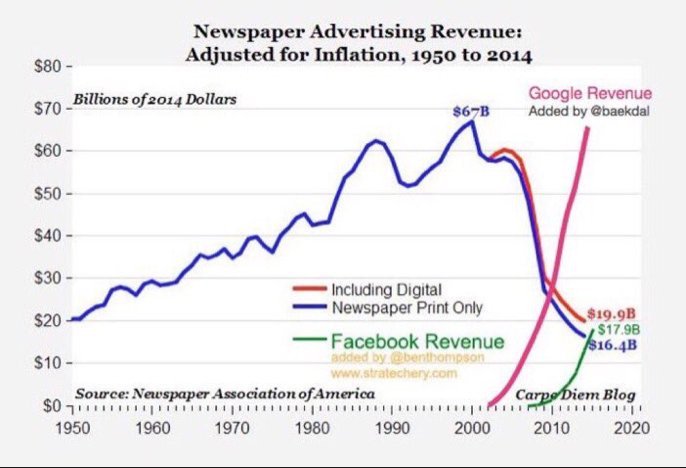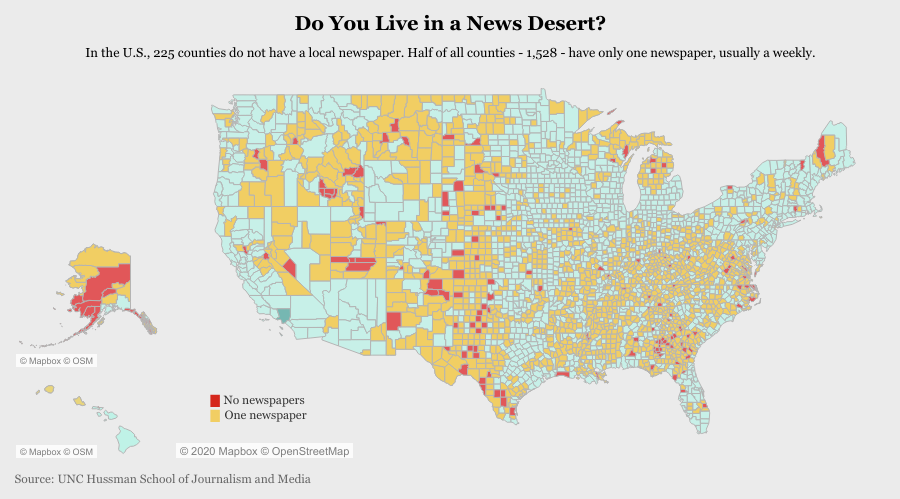Thank you @OPB and @OPBTOL for the opportunity to contribute to the conversation on "Local Newspapers Suffering Steep Declines" yesterday. https://www.spreaker.com/user/oregonpublicbroadcasting/local-newspapers-suffering-steep-decline">https://www.spreaker.com/user/oreg... > Here& #39;s a quick recap, of why we are where we are. And some solutions / questions about moving fwd. 1/
COVID-19 has accelerated long-term trends which have beset the newspaper industry (at all levels) since the early 00s. The loss of an advertising-led revenue model has had a huge impact on newsrooms. Circulation increases don& #39;t bring in equivalent $$$. Image via @pewjournalism 2/
75% of newspaper advertising revenues disappeared between 2000-2014, as many advertisers moved to digital platforms (in particular Google and Facebook). Efforts from the duopoly to support journalism, while welcome, are a fraction of the $ newspapers lost. Image via @baekdal 3/
This has required newspapers + other media outlets to diversify their revenue streams, with less reliance on advertising. I highlighted some of these efforts in a report for @wnip : https://whatsnewinpublishing.com/50-ways-to-make-media-pay-report-download/">https://whatsnewinpublishing.com/50-ways-t... > but many of these efforts are in sector e.g. events, hit by COVID-19. 4/
Even without the impact of the coronavirus, in most cases digital + other revenues weren& #39;t replacing analogue efforts (such as print advertising) fast enough. The impact of this has been discernible  https://abs.twimg.com/emoji/v2/... draggable="false" alt="👇" title="Down pointing backhand index" aria-label="Emoji: Down pointing backhand index"> 5/
https://abs.twimg.com/emoji/v2/... draggable="false" alt="👇" title="Down pointing backhand index" aria-label="Emoji: Down pointing backhand index"> 5/
The loss of advertising revenues has had a major impact on the newspaper landscape in the USA.
* 20-25% of papers closed or merged since 2004
* 50% of jobs in newsrooms have gone
* 1,300 communities lost coverage
Read @businessofnews for more https://www.usnewsdeserts.com/ ">https://www.usnewsdeserts.com/">... 6/
* 20-25% of papers closed or merged since 2004
* 50% of jobs in newsrooms have gone
* 1,300 communities lost coverage
Read @businessofnews for more https://www.usnewsdeserts.com/ ">https://www.usnewsdeserts.com/">... 6/
Where papers remain, many are "Ghost Newspapers" with little (if any) original reporting, creating very real news deserts. This especially matters during a public health crisis, where access to accurate information tailored + relevant to you - and your community - is crucial. 7/
Newspapers are suffering as advertising budgets of entire industries - entertainment, travel, retail, supermarkets - dry up. Reader generated revenue (e.g. subscriptions) can& #39;t compete with this, even if subscription numbers go up. 8/
And, of course, for many people money is very tight (and only going to become more so). They may not be able to pay for news, to take out new subscriptions, or maintain existing ones. So, what can newspapers do about this? 9/
Many are doing the obvious things: reducing the number of days they print the paper, cutting jobs and furloughing staff. This is happening across the country as @kristenhare shows. https://www.poynter.org/business-work/2020/here-are-the-newsroom-layoffs-furloughs-and-closures-caused-by-the-coronavirus/">https://www.poynter.org/business-... 10/
Some outlets have dropped paywalls for coronavirus content, to ensure that audiences have access to this vital information. Not everyone thinks this is a good idea. https://www.poynter.org/business-work/2020/removing-paywalls-on-coronavirus-coverage-is-noble-it-also-makes-no-sense/">https://www.poynter.org/business-... 11/
I disagree. This is journalism as public service, which may develop relationships with audiences disenfranchised from the news media, or unwilling to pay for it in the past. But, it& #39;s a long term conversion game, and there may not be a long term. https://www.theguardian.com/media/2020/apr/09/coronavirus-us-newspapers-impact">https://www.theguardian.com/media/202... 12/
Other organizations have developed new products - such as coronavirus focussed newsletters and podcasts - which are a potential gateway to driving subscriptions, donations etc. The same caveat applies. @HTameez rounded up some of these initial efforts https://www.niemanlab.org/2020/03/not-to-alarm-you-but-coronavirus-focused-news-products-are-spreading-very-quickly/">https://www.niemanlab.org/2020/03/n... 13/
We have to be honest that a lot of news orgs will not come out the other side of this, as @rasmus_kleis reminds us https://reutersinstitute.politics.ox.ac.uk/risj-review/what-will-coronavirus-pandemic-mean-business-news">https://reutersinstitute.politics.ox.ac.uk/risj-revi... "but this is an opportunity for some." 14/
By necessity, we& #39;ll have to see more partnerships and content sharing. Collaboration - long advocated by @HBCompass and others - will be more important than ever. https://soundcloud.com/demystifying-media/heather-bryant">https://soundcloud.com/demystify... 15/
There are lessons to be learned from the & #39;09 downturn (although this will be worse) and case studies like the partnership between @DailyProgress + @cvilletomorrow highlighted by @CJR https://www.cjr.org/local_news/newsletter-nonprofit-newsroom-charlottesville-tomorrow.php">https://www.cjr.org/local_new... /16
Engagement, engaged journalism, and ensuring that you are serving the information needs of your community will be more important than ever. As ever, I& #39;m following the work of @sojcagora #LetsGather + @AshleyAlvarado and @KPCC as exemplars + inspiration https://soundcloud.com/demystifying-media/37-demystifying-engagement-with-ashley-alvarado">https://soundcloud.com/demystify... /17
It will be interesting to see if the IRS allows more news orgs to follow in the footsteps of @sltrib and migrate to non-profit status. https://www.sltrib.com/news/2019/11/04/historic-shift-salt-lake/">https://www.sltrib.com/news/2019... It& #39;s a move which also means donations from supporters are tax deductible. 18/
I& #39;m curious to see what flexibility news orgs offer in terms of access to content (beyond dropping the paywall for coronavirus coverage) to allow audiences to pay what they want/can. Many outlets offer academic rates, what other tiers can/should they offer? 19/
Lastly, will there be Government support? This can be soft - like valuable public health ads - but other options may also be on the table, and there may be more receptiveness to this idea than in the past. https://www.poynter.org/ethics-trust/2020/many-news-organizations-will-apply-for-federal-money-is-this-the-first-step-to-government-support-for-local-news/">https://www.poynter.org/ethics-tr... /20
Should this fund specific beats (e.g. health, education), be channeled through third parties (e.g. @report4america @propublica local), and target specific communities (e.g. those most at risk of becoming news deserts, non-English language speakers etc.) /21
And what type of orgs should be eligible? Should public money be used to support public companies, many of whom carry large debts and are still seeking to service shareholders? Do you create/use a separate fund for non-profits? /22
Is now the time for Foundations and the Gov to go beyond supporting existing entities by encouraging innovation + entrepreneurship e.g. news start-ups, different ways of working (collaboration, SMS-led services etc.)? Just a few of the things I am thinking about right now... /23

 Read on Twitter
Read on Twitter


 5/" title="Even without the impact of the coronavirus, in most cases digital + other revenues weren& #39;t replacing analogue efforts (such as print advertising) fast enough. The impact of this has been discernible https://abs.twimg.com/emoji/v2/... draggable="false" alt="👇" title="Down pointing backhand index" aria-label="Emoji: Down pointing backhand index"> 5/" class="img-responsive" style="max-width:100%;"/>
5/" title="Even without the impact of the coronavirus, in most cases digital + other revenues weren& #39;t replacing analogue efforts (such as print advertising) fast enough. The impact of this has been discernible https://abs.twimg.com/emoji/v2/... draggable="false" alt="👇" title="Down pointing backhand index" aria-label="Emoji: Down pointing backhand index"> 5/" class="img-responsive" style="max-width:100%;"/>




